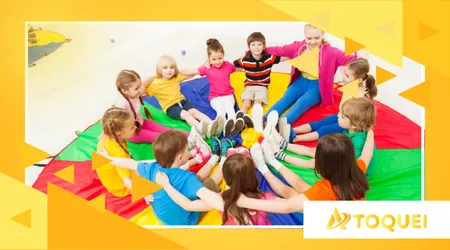Group Musical Games for Children Up to 8 Years Old

Musical games are more than just a game — they are gateways to a universe of cognitive, emotional and social development.
Advertisements
In 2025, with the advancement of technology and the appreciation of playful education, these activities will become even more relevant, especially for children in early childhood.
Music, when combined with movement and group interaction, stimulates brain areas that are essential for healthy growth.
According to a recent study by the University of São Paulo (USP), children who regularly participate in musical games They not only have greater ease in socializing, but also better performance in skills such as attention, memory and fine motor coordination.
But what makes these activities such a powerful tool? The answer lies in the unique combination of rhythm, movement, and collaboration.
Advertisements
When a child dances, sings, or plays an instrument with others, they're not just having fun—they're learning to listen, take turns, and work as a team.
In this article, we will explore the best musical games in a group for children up to 8 years old, with practical examples, proven benefits and tips to apply at home or at school.
Why Musical Games Do they work?
Science has already proven that music activates multiple regions of the brain simultaneously, including areas responsible for language, emotion and movement.
When applied in a group, this stimulation becomes even more powerful.
A clear example is the game “Follow the Musical Leader”, where one child creates a rhythm by clapping and the others must reproduce it.
In addition to working on hearing and coordination, this game teaches leadership and cooperation — essential life skills.
Another crucial factor is repetition. When participating in musical games, children internalize rhythmic and melodic patterns, strengthening their memory and ability to anticipate.
This explains why songs with repetitive gestures, such as “Head, Shoulder, Knee, and Toe,” are so effective.
Practical and Creative Examples

1. “Musical Statue” with Rhythmic Twist
The traditional version is already a classic, but how about jazzing it up? Instead of just stopping when the music pauses, kids should create a movement the exact moment the beat picks up again.
++Three Advanced Fingerpicking Techniques for Solo Guitar
This requires keen auditory attention and quick response, developing not only musical perception but also motor control.
To increase the challenge, the facilitator can vary the speed of the music, creating a dynamic experience full of surprises.
2. “Instrument Race”
Spread various instruments around the room (drum, rattle, triangle, etc.). Play one of them without the children seeing and ask them to identify and run to the correct object.
++The Sounds That Soothe: Music for Children with Anxiety
In addition to training auditory discrimination, this activity encourages quick decision-making.
An interesting variation is to divide the class into teams, turning the game into a healthy competition that encourages teamwork.
The Cognitive and Social Impact of the Musical Games
The benefits of musical games go far beyond fun. The table below, based on data from the Brazilian Society of Pediatrics (2024), shows the measurable impact of these activities:
| Ability | Observed Improvement |
|---|---|
| Motor coordination | 40% |
| Socialization | 35% |
| Concentration | 25% |
| Language | 30% |
Furthermore, group music strengthens emotional bonds. When children sing together, they create a sense of belonging, reducing anxiety and shyness.
How to Choose the Right Activity?

Age range is a determining factor. Younger children (2-5 years) benefit from musical games with simple gestures and repetitions, like “The Frog Doesn’t Wash His Feet”.
Older children (6-8 years old) can deal with more complex challenges, such as collective compositions with instruments.
Another crucial point is adaptation. If a child has motor difficulties, replace dance steps with clapping. The important thing is to maintain inclusion and positive encouragement.
Read also: Honest Review: Children's Toy Instrument That Actually Teaches
Trends in 2025 (Musical Games)
Technology is revolutionizing the musical gamesAugmented reality apps, like Musical Me, project musical notes onto the floor, which children must “step” on in time.
Additionally, educational platforms like Online Music School offer resources for teachers and parents, with themed playlists and adapted instrument tutorials.
The Importance of Musicalization in Early Childhood
Music goes far beyond entertainment — it is a fundamental pillar in child development.
In the first years of life, the brain is especially receptive to sound and rhythmic stimuli, which help build important neural connections.
Studies show that children exposed to musical activities from an early age develop better phonological awareness, an essential skill for literacy.
When they clap along to words or sing along to simple melodies, they are unconsciously training their perception of sounds and syllables—a skill that will be crucial when they begin to read and write.
Adapting Musical Games to Different Spaces
Many parents and educators think they need large spaces or expensive materials to implement musical games, but the reality is quite different. A living room can be transformed into a musical stage with creativity.
Suggested reading: Group Musical Games for Children Up to 8 Years Old
For small spaces, games like “Musical Cordless Telephone” (where children hum a melody) or “Body Drumming” (creating rhythms with body parts) are perfect.
In open spaces, games like “Musical Chairs” or “Follow the Sound” (hiding a whistle or rattle) allow for greater movement and sound exploration.
Conclusion: Music as a Foundation for the Future
In an increasingly digital world, musical games in a group stand out as an irreplaceable sensory and human experience.
They combine fun, learning and connection, preparing children for academic and social challenges.
How about starting today? Gather the family, choose an activity, and watch the magic happen. After all, as the old saying goes: "Those who sing, drive away their troubles."
Frequently Asked Questions
1. My son is 3 years old. Which musical game is ideal?
Games with simple gestures, such as “March Soldier” or “Ring Around the Ring”, are perfect for this age.
2. Can shy children benefit from these activities?
Yes! Group music helps gradually reduce shyness, creating a welcoming environment.
3. Do I need expensive instruments?
No. Pots, spoons, and cups can be turned into improvised drums. The important thing is creativity!
Was this content helpful? Share it and inspire other families to explore the world of musical games!
